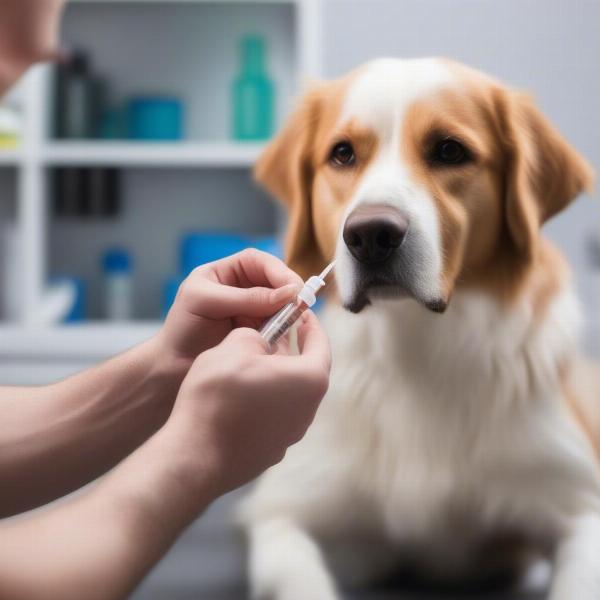Augmentin is a commonly prescribed antibiotic for dogs, used to treat a variety of bacterial infections. Understanding the correct Augmentin dog dose is crucial for effective treatment and the safety of your furry friend. This guide provides essential information about Augmentin dosage for dogs, potential side effects, and important considerations for pet owners.
Understanding Augmentin for Dogs
Augmentin is a combination antibiotic containing amoxicillin and clavulanic acid. Amoxicillin works by inhibiting bacterial growth, while clavulanic acid prevents bacteria from destroying the amoxicillin, making it more effective. Vets prescribe Augmentin for infections such as skin infections, respiratory infections, urinary tract infections, and wound infections. It’s vital to remember that Augmentin is a prescription medication and should only be given under the direction of a veterinarian. Never self-medicate your dog, as incorrect dosage or usage can lead to adverse effects and antibiotic resistance.
Determining the Right Augmentin Dog Dose
The correct Augmentin dog dose depends on several factors, including the dog’s weight, the type and severity of the infection, and the individual dog’s health. A typical dose is 6.25 mg/lb of body weight, administered twice daily. However, this can vary, and your veterinarian will determine the appropriate dosage for your dog’s specific needs. Augmentin comes in various forms, including tablets, chewable tablets, and liquid suspension. Follow your veterinarian’s instructions carefully regarding the form and frequency of administration.
Potential Side Effects of Augmentin in Dogs
While generally safe, Augmentin can cause some side effects in dogs. Common side effects include vomiting, diarrhea, loss of appetite, and allergic reactions. More serious side effects are rare but can include liver damage and seizures. If you notice any unusual symptoms in your dog after administering Augmentin, contact your veterinarian immediately.
Important Considerations When Administering Augmentin to Dogs
Always complete the full course of Augmentin prescribed by your veterinarian, even if your dog’s symptoms improve. Stopping the medication early can lead to incomplete eradication of the infection and antibiotic resistance. Store Augmentin in a cool, dry place away from direct sunlight. If using the liquid suspension, shake well before each use. Never give Augmentin to cats, as it can be toxic.
What if I Miss a Dose?
If you miss a dose of Augmentin, give it to your dog as soon as you remember. However, if it is almost time for the next dose, skip the missed dose and resume the regular dosing schedule. Do not give a double dose to compensate for a missed dose.
 Administering Augmentin to a Dog
Administering Augmentin to a Dog
Conclusion: Ensuring Your Dog’s Safety with the Correct Augmentin Dose
Administering the correct Augmentin dog dose is crucial for effective treatment and your dog’s well-being. Always follow your veterinarian’s instructions and monitor your dog closely for any adverse reactions. By working closely with your veterinarian, you can ensure your furry friend receives the best possible care and a speedy recovery.
FAQ:
- What is Augmentin used for in dogs? Augmentin is used to treat bacterial infections in dogs, including skin, respiratory, urinary tract, and wound infections.
- What are the potential side effects of Augmentin in dogs? Common side effects include vomiting, diarrhea, loss of appetite, and allergic reactions. More severe but rare side effects can include liver damage and seizures.
- Can I give my dog Augmentin without a prescription? No, Augmentin is a prescription medication and should only be given under the direction of a veterinarian.
- What should I do if I miss a dose of Augmentin for my dog? Give the missed dose as soon as you remember, but if it’s almost time for the next dose, skip the missed dose and continue with the regular schedule. Do not double dose.
- Can I give Augmentin to my cat? No, Augmentin can be toxic to cats and should never be administered to them.
- How should I store Augmentin? Store Augmentin in a cool, dry place away from direct sunlight. Shake the liquid suspension well before each use.
- What if my dog’s symptoms don’t improve after taking Augmentin? Contact your veterinarian, as a different antibiotic or treatment may be necessary.
ILM Dog is a leading online resource for dog owners worldwide, providing expert advice on all aspects of dog care, from breed selection and health to training, nutrition, and grooming. We are dedicated to helping you provide the best possible care for your canine companion. Our expertise covers a wide range of topics including dog breeds, health and medical care, training and behavior, nutrition and feeding, grooming, and products and accessories. For expert advice tailored to your dog’s specific needs, contact us at [email protected] or call +44 20-3965-8624. ILM Dog is committed to helping you and your furry friend live a happy and healthy life together.